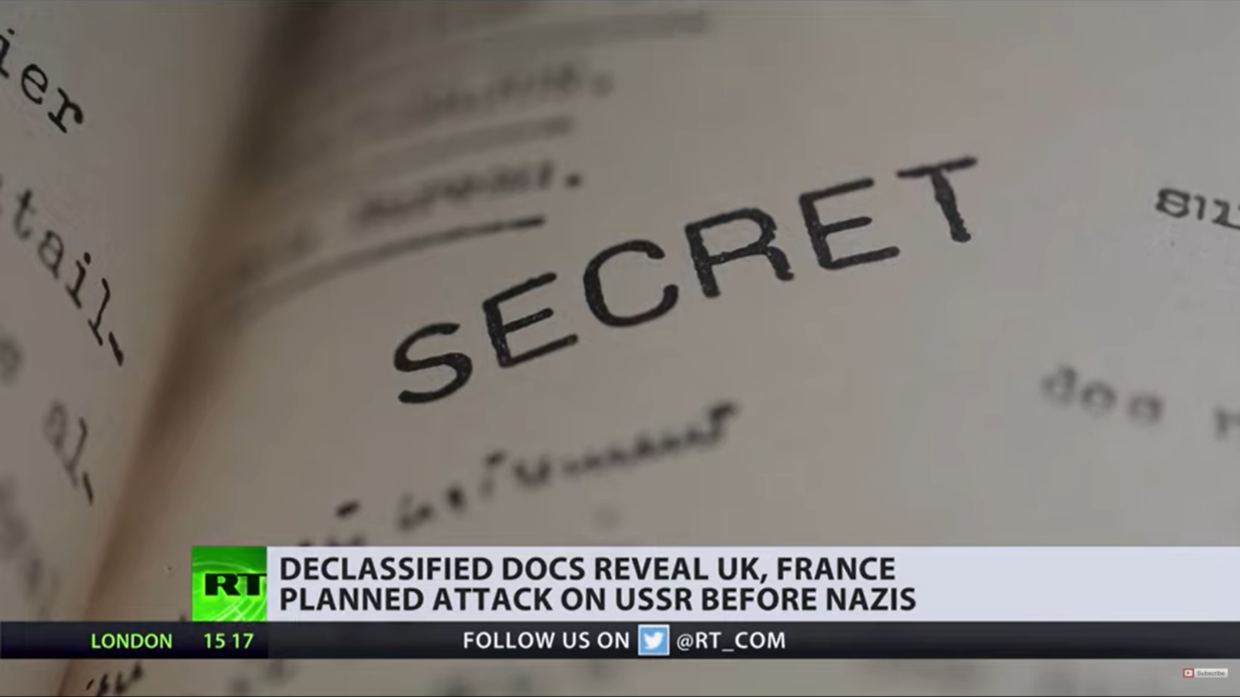Moscow's reluctant World War II allies France and Britain considered bombing the Soviet Union before Hitler's Nazis invaded, newly declassified documents show. Their goal was to disrupt supplies of fuel from southern oilfields.
The Russian national archive this week is hosting a new exhibition about the Soviet Union’s actions on the global stage between September 1939, when World War II began in earnest, and June 1941, when Nazi Germany and its allies - including Italy, Finland, Romania, Slovakia and Hungary - invaded the USSR.
RT was given a preview of the artefacts on display, some of which have never been shown to the general public before. Among them are French documents detailing plans to launch an aerial bombing campaign against the USSR, which were developed together with its British allies shortly before the German invasion of France in May 1940.
Maurice Gamelin, the French commander-in-chief at the time, eyed using French troops in Syria to attack oilfields in what is now Azerbaijan, as well as its capital Baku. Azeri oil was the most important source of fuel for the USSR and, by extension, Germany, if it could get its hands on the territory. Moscow and Berlin at the time had a non-aggression pact, even as Hitler was preparing to stab Stalin in the back. An act which didn't surprise shrewd thinkers in Moscow.
The suggested French airstrikes would have been launched in conjunction with other activities aimed at undermining the USSR, like inciting its Muslim population to rebel against Moscow. Germany’s blitzkrieg in France threw a spanner in those plans.
Also on rt.com For all the talk of 'Stalin's successes,' the Soviet Union smashed the Nazis in spite of his harsh leadership, not because of itThe short-lived Stalin-Hitler deal came into being only after Moscow’s attempts to sign a mutual defense agreement with Paris and London was rejected by the West Europeans. The same powers gave Berlin the green light to annex Czechoslovakia in 1938 and stood by as Germany invaded Poland, the following year. The eight-month period following Britain's declaration of hostilities is known as the Phoney War.
The reluctance of the Western European heavyweights to join forces with the Soviets against Germany was not surprising. This was long before Hitler’s name became synonymous with unspeakable evil and fascist ideology had many sympathisers in the West, including among its elites.
Stalin, on the other hand, led a nation that had declared global socialist revolution as its goal and was perceived as the greater threat by many. There was no shortage of politicians who would gladly see the Germans crush the Soviets.
The USSR had no reliable allies in Europe and lots of potential enemies, so its leadership believed it could enhance its security through land grabs of its own. Materials shown by the Russian archive relate to Moscow’s attempt to negotiate a land swap with Finland, the failure of which led to an attack in November 1939, the coerced incorporation of the Baltic states, and USSR’s takeover of eastern parts of Poland shortly after it was attacked by the Nazis. Other episodes of that hectic period in modern history are also covered.
Also on rt.com 80 years after Nazi invasion of USSR, Ukraine's main opposition party asks Kiev to finally clamp down on neo-Nazi organizationsThere has been a strong revisionist push to label Stalin’s Soviet Union an evil force on a par with Hitler’s Germany, depicting the two strongmen as co-responsible for the European part of the deadliest armed conflict in human history. Moscow sees this as a smear, a distorted version of events that conveniently glosses over the role played by Hitler’s collaborators in Eastern Europe, and by appeasers elsewhere.
Stalin by no means was a peacenik or a humanitarian. However, the exhibition is meant to provide additional context for the situation in which the ruthless Georgian commander was operating.
If you like this story, share it with a friend!


